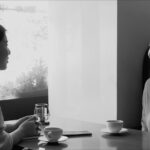Ah-Rong’s (Yu An Shun) eatery is exactly the kind of place every local community needs. Serving simple dishes (noodles, dumplings, etc), his cheap, no-frills establishment is perfect for a quick meal after work or after a long walk. But surviving in 21st-century Taipei, where the moneyed class would rather have Sichuanese hotpot, proves immensely difficult.
Things take a turn for the worse when their landlord, tired of a country characterised by endless elections, the existential threat of China and a dying economy, sells up, leaving Rong in the hands of the smartly dressed and ruthlessly capitalist Bruce (Liu Han Chiang).
KEFF’s debut Locust (2024) bitterly laments the state of Rong’s eatery, using it as a metaphor for one of the most precarious countries in the world; constantly on the verge of being taken over by malevolent, all-powerful, and seemingly undefeatable forces. Ambitious, methodical and loaded with meaning, Locust is the definition of a promising debut, making me want to see more from KEFF while seeing lots of room for improvement.
Set in 2019, the spectre of Chinese invasion lingers over every frame. The question is whether people are actually interested. The opening scene is particularly masterful; panning from television footage of clampdown in Hong Kong to patrons of a launderette, buried in their phones. They only look up when it’s announced a French restauranter has opened a new bakery. Taiwan has every reason to be concerned for its future. But most people are more interested in a fancy new type of eclair.
The mute Zhong-Han (Liu Wei Chen) might not be related to Rong and his wife, but they treat the village boy as a son, letting him live with them in return for menial tasks. But he quickly grows tired of his lot in life, falling in with a group of gangsters working for Boss Wang (Frank Lin).
Zhong-Han is not only mute, but he barely signs either. Rarely giving us verbal insight into his character, he is a cypher for the competing interests of contemporary Taiwan; caught between gang violence, useless politicking and rampant capitalism. It’s hard to know what he’s thinking, the audience reliant upon Chen’s complex body language to guide us through feelings of rage, hopelessness and the hunger for power.
There’s a bit of A Brighter Summer Day (Edward Yang, 1991) here, both in the militia-like make-up of the gangsters and in a passive protagonist navigating the chaos of a rapidly-changing nation. But once the gangsters start extorting the wealthy — in brothels, clubs, karaoke bars — KEFF puts a decisively modern spin on things; in a stand-out scene, yuppie assholes are taunted by the gangsters in Barack Obama and Hilary Clinton masks while abstract video art blares in the background. In these moments, Locust is a menacing beast of a movie, highly compensating for large stretches of unsatisfying character moments, mixed metaphors and a weak romantic subplot.
When Bruce turns the screws on Rong, the ending appears clear — but KEFF avoids the obvious revenge-on-the-privileged route in favour of something far more nefarious. As Hong Kong shows, the best will in the world might not make any difference. For now, Taiwan carries on, with both external and internal forces threatening to turn the country inside out. There are no easy answers. In the meantime, support your local restaurant!
Redmond is the editor-in-chief of Journey Into Cinema.





